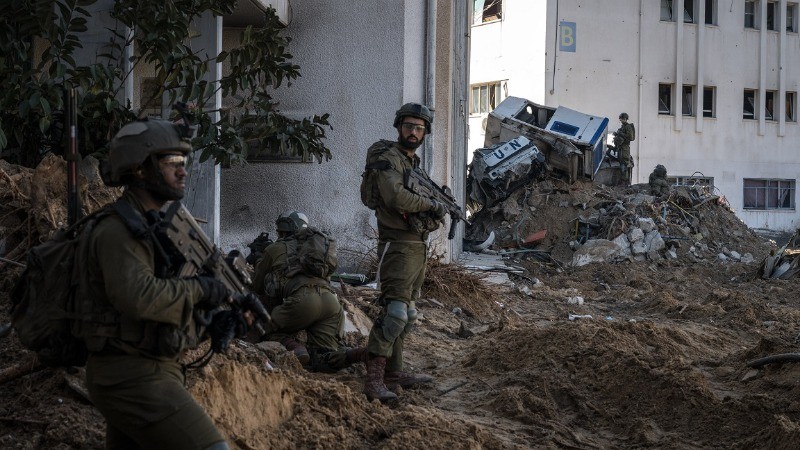
In early March, Mohammed Shubeir, a 17-year-old from Khan Younis in the southern Gaza Strip, was detained by Israeli soldiers for around ten days before being released without charges. During his detention, he claimed that the soldiers forced him to act as a human shield.
Shubeir described being handcuffed and made to walk through the wreckage of his hometown to search for explosives allegedly placed by Hamas. The soldiers instructed him to proceed ahead of them to avoid potential explosions. In one instance, he found himself near a wall lined with wires connected to explosives. "The soldiers sent me like a dog to a booby-trapped apartment," he recalled, fearing for his life.
An investigation found that Israeli forces have regularly compelled captured Palestinians to undertake risky reconnaissance missions throughout the Israel-Hamas conflict. This practice, deemed illegal under both Israeli and international law, has involved at least 11 units in five Gaza cities, often with the support of Israeli intelligence officers.
Palestinian detainees were reportedly coerced into scouting locations where the military suspected Hamas fighters had set traps or ambushes. These operations have become more frequent since the onset of the conflict last October. Detainees have been used to navigate tunnel networks, search for explosives in rigged buildings, and handle objects like generators that could conceal entrances to tunnels or traps.
Interviews with seven Israeli soldiers revealed that this practice has been normalized and conducted with significant logistical coordination, involving intelligence officers who oversee the transportation and handling of detainees. They reported that both low-ranking and senior officers were aware of the use of human shields, which soldiers referred to using consistent terminology.
Major General Tamir Hayman, a former chief of military intelligence, confirmed that some detainees had been forced to enter tunnels while others volunteered in hopes of gaining favor with the military. Three Palestinians also provided accounts of being used as human shields.
Although there was no evidence of any detainees being harmed while fulfilling these roles, one incident involved an Israeli officer being shot after a detainee failed to identify a hiding militant.
The Israeli military stated that its policies strictly forbid using detained civilians for military operations and mentioned that the accounts of detainees and soldiers would be reviewed by relevant authorities.
International law prohibits the use of civilians or combatants as shields during conflicts. Even in situations involving nonstate actors like Hamas, forcing Palestinian detainees to explore dangerous areas is illegal.
The Israeli military previously utilized a similar tactic known as the "neighbor procedure," where Palestinian civilians were compelled to approach the homes of militants. This method was banned by Israel's Supreme Court in 2005, which ruled that no civilian should be placed in a situation where a military operation is occurring.
The ongoing Israel-Hamas conflict began in October 2023 when Hamas and its allies committed severe acts of violence in Israel. In response, Israel launched a counteroffensive that has resulted in significant Palestinian casualties.
Israeli forces have justified their actions by claiming that Hamas embeds its operations within civilian areas, using communities as shields. However, the method of employing human shields differs significantly.
Professor Michael N. Schmitt from West Point noted that he is unaware of any other military that routinely employs civilians or captured individuals for dangerous reconnaissance tasks in recent history. Such actions could be classified as war crimes.
Some Israeli soldiers expressed discomfort with this practice, indicating that it stemmed from a desire to mitigate risks to their units. A few soldiers who spoke out did so with the support of the organization Breaking the Silence, which gathers testimonies from Israeli military personnel.
One soldier recounted how his squad forced displaced Palestinians to walk in front of them as they advanced toward a suspected militant hideout. After successfully engaging the militants, the soldiers allowed the civilians to leave unharmed.
Hamas has transformed large sections of Gaza into complex networks of traps and tunnels, complicating Israeli military operations. When confronted with potential threats in civilian areas, soldiers have occasionally relied on drones or sniffer dogs. However, in the absence of these resources, they have resorted to using Palestinians.
Basheer al-Dalou, a 43-year-old pharmacist from Gaza City, recounted his experience on November 13, when he was captured at home and forced to act as a human shield. After being interrogated about Hamas activity, he was ordered to enter the backyard of a nearby building, which was filled with debris and potentially dangerous objects.
Al-Dalou described being pushed forward by soldiers who were concerned about hidden explosives. He was forced to walk barefoot, injuring his feet on broken glass, and was ordered to examine objects in the yard. When he hesitated, he was struck with a rifle butt.
Later that day, he was compelled to walk in front of an advancing Israeli tank toward a mosque where militants were suspected to be hiding. He also mentioned neighbors who had been taken to search for tunnel entrances at a hospital and were unaccounted for since.
After a harrowing day, he was transferred to a detention center in Israel, which he saw as a safer option compared to his previous ordeal.
In February, the Israeli military took control of the Gaza City headquarters of UNRWA, discovering Hamas tunnels beneath the compound. Instead of employing military engineers to explore these tunnels, they decided to send a detained Palestinian with a body camera for reconnaissance.
Throughout the war, soldiers referred to detained individuals using terms like "wasps" for those brought from Israel for specific missions and "mosquitoes" for those captured in Gaza. This terminology highlights the perceived expendability of these individuals in military operations.